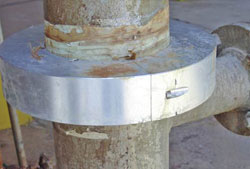Saudi Aramco industrial facilities often take a beating. Fouling and scaling reduce heat transfer in exchanger tubes and cause corrosion in pipes. That can lead to a loss of production as unplanned shutdowns become necessary to fix leaking equipment. Standard methods of chemical treatment reduce fouling and corrosion, but their effects can be limited. So Riyadh Refinery is pioneering a new technology by the Merus Company.
The technology resolves cooling-water issues and provides a state-of-the-art technique to eliminate fouling and to clean fouled equipment. That, in turn, saves the time and money that would have been required to descale fouled equipment and, in some cases, replace it.
Riyadh Refinery introduced the technology early in 2007 by piloting field tests in four cooling-water exchangers that had a troublesome history of fouling. After six months, one exchanger was opened and found to be remarkably clean.
To better understand the technology, a little chemistry lesson is in order: All substances in nature consist of molecules of several atoms that are in constant motion with their own unique oscillations. The Merus unit measures those oscillations and responds with interfering oscillations.
The result is that the physical properties of the substance change, making it more soluble, which carries the substance away, rather than depositing it on vessels and pipes. Lime, for instance, does not solidify as quickly and is continuously flushed out.
Implementing the technology saves an average cleaning cost of $3,500 per exchanger and improves equipment performance by 10 percent to 15 percent. “We are now working to further pilot this technology in hydrocarbon applications,” said senior mechanical engineer Abdullah M. Al-Harbi, who brought the technology to Saudi Aramco.










